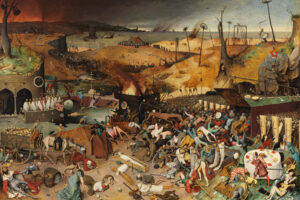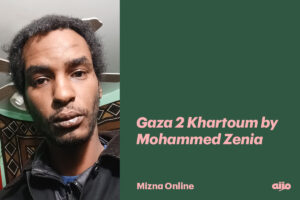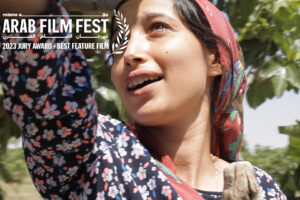
January 21, 2002
Arab-Americans Find a Liberating Voice in “The Cloud Of The Desert”
Biographical Info
LITERARY JOURNAL PROVIDES FOCUS FOR A PROUD AND DIVERSE COMMUNITY TO EXPRESS ITSELF IN AN ERA OF MISUNDERSTANDING
Anayat Durrani, Special to The Daily Star
LOS ANGELES: The voice of Arab-Americans is eloquently expressed on the pages of Mizna, the only Arab-American literary journal in the United States. Since its conception three years ago, Mizna has offered insights into the Arab-American experience.
In Arabic, mizna means “the cloud of the desert,” one that provides cool shade for the weary desert traveler and protection from the blazing sun.
“We found this to be a fitting metaphor for our purposes as a literary journal for the Arab- American community, which is still kind of wandering around in the desert so to speak,” said Kathryn Haddad, a Lebanese-American and one of the main founders of Mizna.
“We wanted to be the cooling cloud of shade and guidance.”
Mizna began in 1996 as a newsletter for the American Arab Anti-Discrimination Committee (ADC) in Minnesota, where Haddad served as president of the organization’s local chapter. It initially contained news of interest to Arab-Americans, but gradually began to include literary works. Soon, the idea for establishing an Arab-American literary journal took flight and by 1998 Mizna was incorporated. The first issue of Mizna was published in January 1999.
“It became clear to me that Mizna was necessary many years ago when I would read ‘multicultural literature’ and found that Arab-Americans were not represented. I wrote with the Asian-American community and knew that Arabs needed a similar literary outlet that other people of color in America had,” said Haddad, a high school English teacher in Minnesota and the executive director of Mizna.
Mizna features poetry, short stories, opinions, essays and art by and about Arab-Americans. Many well-known Arab-American writers are featured in the journal, including Naomi Shihab Nye, Elmaz Abinader, David Williams, Issa Boullatta and Khalid Mattawa.
Then there is D. H. Melhelm, a published writer, poet, essayist and novelist with 30 years of experience under her belt. Her Bombing Blues an anti-war poem was published in the most recent issue of Mizna. Melhelm, the daughter of Lebanese immigrants, has nothing but praise for the journal.
“Mizna is a high-quality literary journal. Its existence is crucial, particularly in this climate of suspicion and revenge,” she said.
“Mizna affirms the humanity of Arab-Americans at a time when they are being demonized. And it offers a forum of sensibility, a channel for expressing through art a minority viewpoint that keeps conscience alive.”
The journal currently has 500 subscribers from around the world: in the United States, Canada, Germany, England, the UAE, Jordan and Lebanon. Subscribers are as diverse as universities, cultural organizations and libraries, and include the US Library of Congress. Mizna is published three times a year and compensates its writers from grants from the Jerome Foundation, among others, as well as from private donors and subscribers.
“We put nearly all our funding into the journal and paying the artists,” explained Lorie Haddad, Kathryn’s sister and the magazine’s financial director. “We do this work for all practical purposes for the love of the journal. And I think that speaks volumes in terms of everyone’s commitment and the idea that this is so necessary for America.”
The subjects covered in the journal are broad and include topics like politics, religion, sexuality, feminism and nationality, among others. Though most of the writers are generally of Arab descent, the journal welcomes writers from diverse backgrounds and viewpoints.
Youssef el-Guindi is an established Egyptian-American poet, playwright and writer whose poems were featured in an earlier volume of Mizna. His short story Stage Directions for an Extended Conversation will be featured in the upcoming issue of Mizna, which will be published in early February.
“I strongly feel that one of the ways for a community to cohere is through its cultural output,” said Guindi. “Not only creating, but reading the stories that reflect us back to ourselves. Art, in all its various mediums, is a vital and necessary record of a people.
“It allows a community to breathe, validating it, giving it a legitimacy and quiet power that it’s being heard heard on a deeper and more intimate level than the sometimes shrill and erroneous impressions we get in the news.”
The Sept. 11 attacks and their aftermath have left their mark on Arab-Americans, eliciting emotions that have taken life in poems and short stories found within Mizna. Mizna dedicated an entire issue to the victims of the attacks, including Afghan victims from US and British bombings and those being held in administrative detention in the United States.
“We wanted to express our sorrow and outrage at what happened on that day and since that day, and felt we could do so by dedicating our journal to all of the victims,” explained Kathryn Haddad.
“We wanted to make a statement that there are many victims of that horrible day and that there continues to be victims. We felt we had to say something about it.”
The backlash and overall climate of distrust toward all things Arab has done little to muffle the voices of Arab-American writers and poets. Mizna is evidence of this.
“As Arabs and Arab-Americans it seems like we have to prove almost daily that we are not this and not that,” said Lorie Haddad. “I believe we are the most misunderstood group of people in the world right now.
“It is liberating to have someplace where we can express ourselves without worrying about being misinterpreted or misrepresented.”
There are 3 million to 4 million Arab-Americans living in the United States, each with their own story and experience. In time, many more will add their voices to the pages of Mizna. “Mizna speaks to what we are, in our own words,” said Lorie Haddad. “And we are diverse and proud.”












